|
|
|
Sort Order |
|
|
|
Items / Page
|
|
|
|
|
|
|
| Srl | Item |
| 1 |
ID:
187474
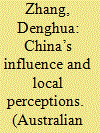

|
|
|
|
|
| Summary/Abstract |
Traditional powers have growing concerns about China’s influence in the Global South derived from its fast-growing outreach in the past two decades. However, how stakeholders in developing countries perceive China’s engagement and influence remains largely unknown. Drawing upon a survey of 210 participants and 30 follow-up interviews in the Pacific region with a focus on Papua New Guinea, Fiji and Tonga, this paper examines Pacific civil society stakeholders’ perceptions about China. It suggests that these perceptions are nuanced at best and reveals concerns about the Belt and Road Initiative, Chinese foreign aid and China-Pacific relations. It argues that China’s influence on Pacific civil society is weak, but this may be different in the political, government and business sectors. More similar research is required to develop a comprehensive understanding.
|
|
|
|
|
|
|
|
|
|
|
|
|
|
|
|
| 2 |
ID:
187470


|
|
|
|
|
| Summary/Abstract |
As the U.S.-China strategic rivalry has intensified, Washington has looked to its close allies and partners to counter Chinese clout in global technology leadership. With the Huawei ban as a proxy for the U.S.-China competition, the paper focuses on the concept of the alliance halo and analyzes how the three key U.S. allies in Asia—Australia, Japan, and South Korea—responded to Washington’s expectations of mutual support on the decoupling of Chinese technology companies from global supply chains. We argue that given that the Huawei ban is about future risks associated with China’s economy, as opposed to demonstrated military threats, it was more challenging to establish allied reliability within the U.S. alliance network as a whole. Our comparative analysis shows that Australia’s reactions have been the most direct, banning Huawei before the United States, showing a contrast with South Korea’s relatively muted responses. Japan’s decision to ban Huawei was as decisive as Australia’s but Tokyo sought to keep a low profile. Rather than the diplomatic pressure from the Trump administration, these allies’ varied responses resulted from their own assessments of security risks associated with Huawei.
|
|
|
|
|
|
|
|
|
|
|
|
|
|
|
|
| 3 |
ID:
187471
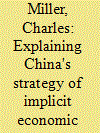

|
|
|
|
|
| Summary/Abstract |
The recent ‘trade war' between Australia and China has understandably sparked fear amongst Australian policymakers, voters and businesses. China's alleged economic coercion towards Australia has the strange property that Chinese leaders are not making any clear explicit demands of Australia. Moreover, this behaviour follows a pattern in recent Chinese dealings with other Asia-Pacific states. Why would a state initiate economic coercion without making clear demands? In this paper, I offer an explanation, building on the logic of audience costs in wars of attrition. I suggest that China's strategy of economic coercion without explicit demands serves a key strategic purpose. Omitting specific demands makes the outcome of any given dispute less clear and hence makes it easier for either side to claim victory. This negates a key advantage which democratic states have in bargaining with autocratic adversaries—the fact that their audience costs for backing down are usually higher, which makes them less likely to initiate but more likely to win international disputes. Implicit economic coercion should therefore be a strategy which is primarily targeted at China’s democratic trading partners. I examine the record of Chinese uses of economic coercion in the past and find that this pattern finds much support.
|
|
|
|
|
|
|
|
|
|
|
|
|
|
|
|
| 4 |
ID:
187472
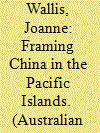

|
|
|
|
|
| Summary/Abstract |
How did many Australians come to accept that competition, rather than cooperation, with China was necessary in the Pacific Islands? We use discourse analysis techniques to examine the role that framings in Australian official discourse, media, and commentary over the last decade (2011–2021) played in constructing China’s presence in the region as threatening such that many Australians have accepted that policies aimed at competing with China are the most reasonable foreign and strategic policy response. We find that Australian official discourse was characterised by qualified optimism about China’s role until 2018, when a more explicit emphasis on competition emerged. Echoing this shift, while the media and (much of) the commentary framed China’s role in terms of threat and competition throughout the decade, this framing increased significantly in 2018. It is impossible to isolate the Australian government’s policy approach to China in the Pacific Islands from its broader understanding of China’s increasingly activist role in Australia, the Indo-Pacific, and globally. But our findings suggest that, by consistently framing China in terms of threat and competition, the media and – to a lesser extent, commentary – created an enabling environment for the public to accept changes to the Australian government’s policies.
|
|
|
|
|
|
|
|
|
|
|
|
|
|
|
|
| 5 |
ID:
187469
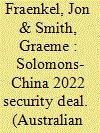

|
|
|
|
|
| Summary/Abstract |
A security deal struck between the Solomon Islands and China in April 2022 has been depicted as the precursor to the establishment of a Chinese naval base in the Pacific. Fed by the proximity of an Australian federal election, these fears have stimulated lurid images in the Australian press of Beijing's aircraft carriers being stationed off Brisbane's coast creating a Pacific version of the 1962 Cuban missile crisis. In this paper, we examine the provisions of the ‘framework agreement’, explore its rationale and consider the likelihood that the predicted naval base eventuates. We also investigate Chinese extraterritoriality on the global stage and Chinese commercial activity in the Solomons since the switch in diplomatic recognition from Taipei to Beijing in 2019. We argue that Solomon Islands Prime Minister Manasseh Sogavare signed the deal primarily in response to domestic pressures, in particular the danger of a repeat of major riots that took place in the capital in November 2021. The most pressing risk is not Chinese warships or nuclear missiles stationed in Honiara, but repression to handle urban unrest without the restraint required of Australian, Papua New Guinean, Fijian or New Zealand police officers.
|
|
|
|
|
|
|
|
|
|
|
|
|
|
|
|
| 6 |
ID:
187475
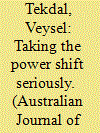

|
|
|
|
|
| Summary/Abstract |
It is widely agreed that recent decades have witnessed a power shift towards the emerging economies. Yet the magnitude of the power shift and its implications for the global economic order are much contested. For some, the diffusion of power has been changing the power relations between the global North and global South as well as within the global South. For others, the emerging economies do not pose a significant challenge to the global North’s dominance in the global political economy as the latter continues to hold structural power advantages in technology, finance, and institutional capacity. This paper contributes to this debate by analysing the changing power relations in the field of development cooperation. As shown by recent work, Chinese development finance, combining a massive scale, global reach, and distinctive modalities, has reshaped the global landscape of development finance. This paper offers an interpretation of this transformation with a focus on power relations. It argues that Chinese development finance has not only decreased the ability of Western development finance institutions to influence policy agendas and preferences in the developing world, but also eroded the latter’s power to shape the governance, norms, and modalities of development cooperation.
|
|
|
|
|
|
|
|
|
|
|
|
|
|
|
|
| 7 |
ID:
187473


|
|
|
|
|
| Summary/Abstract |
This article examines how the rise of geoeconomics vis-à-vis geopolitics has influenced the Turkish-Chinese rapprochement. It focuses on the impacts of the rise of geoeconomics on the long-term military alliances established in the Cold War and the strategic autonomy of smaller states that were once primarily dependent on their great power allies for their economic and regime security. Besides, it deals with the case-specific factors pushing Turkey towards China such as the rising authoritarian tendencies in Turkey and Ankara's disagreements on regional security issues with its traditional Western allies. Those factors have had negative repercussions on Turkey's economy, while the government has been facing a strong domestic imperative to continue infrastructure and construction projects which had contributed to the rapid economic growth in the 2000s. This situation has facilitated China's geoeconomic power projections seeking to create asymmetrical interdependence with Turkey and to influence Ankara's significant political and economic decisions. This article also underlines the limits of Turkish-Chinese rapprochement like Turkey's long-standing interdependence with the West and the relatively small role played by China in the Turkish economy. It concludes that Sino-Turkish ‘geoeconomic rapprochement' would neither ensure Turkey’s economic recovery nor increase its strategic autonomy unless Turkish-Western relations are ameliorated.
|
|
|
|
|
|
|
|
|
|
|
|
|
|
|
|
|
|
|
|
|